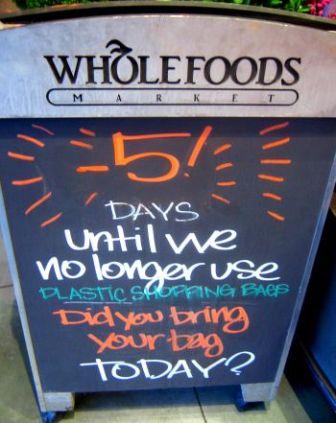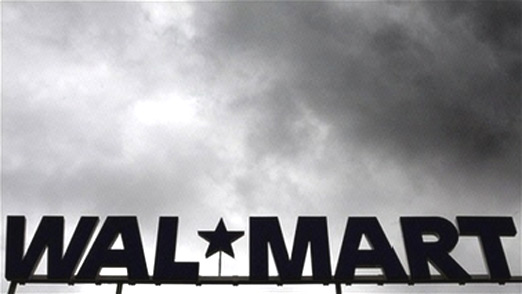By Paige Donner
I'll 'fess up. "Democratizing sustainability," is not a phrase I coined nor one I've even used before. I first came across this "big idea" when reading a Fortune Magazine, July 2006 article about Wal-Mart, the "Green Machine," written by Marc Gunther. In it he says that, "The bigger idea here is that poor and middle-income Americans are every bit as interested in buying green products as are the well-to-do, so long as they are affordable."
Considering that Wal-Mart's sustainability initiatives can reach its 1.8 million employees, its 176 million weekly customers and its 60,000 suppliers, we're talking direct and massive influence exactly where it matters: on people's purchasing habits.
So when Charles Zimmerman, Vice-President of Prototype and New Format Development for Wal-Mart, walked onto the UCLA campus this past weekend to deliver his speech, it's no wonder people paid attention to what he had to say.
He began with a quick audit of the UCLA conference hall, "There are two CFL lightbulbs in this room, everything else is incandescent.," began the man who is leading the Sustainable Buildings Network program at Wal-Mart. "You know how many low-flow urinals I saw here? Zero." He continued, "We don't have to wait on President-elect Obama to change. We must all say to ourselves, I will fix this problem when I go home today."
Read Entire Article Here....
Government -mandated regulations or business-led change?
There's a conversation taking place these days, and it's focusing on how best to bring about these changes we know we need. Is it through government regulations or is it through enrepreneurial spirit and business-led initiative? Or is it a combination of both, a public-private partnership, as it were?

"I've never waited for government to do anything," said Michael Besancon, Sr. Global VP of Purchasing, Distribution and Marketing, Whole Foods Market. He cited the example of how Whole Foods drove the market for organic cotton clothing to points of purchase other than a clothing store.

Patagonia's VP of Environmental Programs and Communication, had this to say:
For the $312-billion-a-year retailer, this m.o works. After all, the only entity that purchases more domestic energy than the Wal-Mart stores is the U.S. government. Even so, said Zimmerman, "As big as Wal-Mart is as an energy consumer, we still only consume less than 1% of the U.S.'s total energy." Nonetheless, they wield the purchasing power of a small country. They have asked their suppliers to conform, by 2009, to specified sustainable packaging perameters, which will "change the face of consumer goods packaging," said Barent Roth, a conference attendee and expert in sustainable packaging design. Wal-Mart Packaging Fact Sheet: Download file.

More from Wal-Mart

Charles Zimmerman, Sustainable Buildings Network, Wal-Mart
Paige Donner: Is this "green movement" best led by individuals, entrepreneurs and businesses as opposed to government?

Follow Paige Donner on Twitter: www.twitter.com/greeninghollywd
I'll 'fess up. "Democratizing sustainability," is not a phrase I coined nor one I've even used before. I first came across this "big idea" when reading a Fortune Magazine, July 2006 article about Wal-Mart, the "Green Machine," written by Marc Gunther. In it he says that, "The bigger idea here is that poor and middle-income Americans are every bit as interested in buying green products as are the well-to-do, so long as they are affordable."
Considering that Wal-Mart's sustainability initiatives can reach its 1.8 million employees, its 176 million weekly customers and its 60,000 suppliers, we're talking direct and massive influence exactly where it matters: on people's purchasing habits.
So when Charles Zimmerman, Vice-President of Prototype and New Format Development for Wal-Mart, walked onto the UCLA campus this past weekend to deliver his speech, it's no wonder people paid attention to what he had to say.
He began with a quick audit of the UCLA conference hall, "There are two CFL lightbulbs in this room, everything else is incandescent.," began the man who is leading the Sustainable Buildings Network program at Wal-Mart. "You know how many low-flow urinals I saw here? Zero." He continued, "We don't have to wait on President-elect Obama to change. We must all say to ourselves, I will fix this problem when I go home today."
Read Entire Article Here....
Government -mandated regulations or business-led change?
There's a conversation taking place these days, and it's focusing on how best to bring about these changes we know we need. Is it through government regulations or is it through enrepreneurial spirit and business-led initiative? Or is it a combination of both, a public-private partnership, as it were?

"I've never waited for government to do anything," said Michael Besancon, Sr. Global VP of Purchasing, Distribution and Marketing, Whole Foods Market. He cited the example of how Whole Foods drove the market for organic cotton clothing to points of purchase other than a clothing store.

Patagonia's VP of Environmental Programs and Communication, had this to say:
Rick Ridgeway: A Green Revolution as it were will have to be a combination of entrepreneurial initiative ideally with government support and subsidization. Obama has an opportunity to create a new Green Economy, as everyone is calling it, that in part would be based on incentives for entrepreneurial start-ups in the sector.Paige Donner: If you had had subsidies when you were developing Patagonia, what specifically would have helped you?
Rick Ridgeway: If there had been support for organically grown and produced cotton that would have definitely helped us. When we made that conversion in the late 80's from only using organically grown cotton as a component percentage in our fiber mix to committing to using 100% organically grown cotton that commitment on our part created an initial loss because there wasn't enough organically grown cotton in the supply chain to meet even our own needs.
So, had there been some government support for those kinds of farming techniques, that definitely would have assisted us. Now, the market is going to drive those changes eventually and are even now as more companies, like Wal-Mart, are using these materials.Wal-Mart's Zimmerman said, "Wal-Mart's stock is up. The company that has taken the lead in sustainability is the one company whose stock is up this year." He continued by saying, "We don't need new legislation. We don't need a new President. We don't need a new Congress. We just need to do what we know is right."
But there's a lag time involved and government support could eliminate the lagtime and boost the rate of conversion to those kinds of farming practices and benefit everybody, especially the planet.
For the $312-billion-a-year retailer, this m.o works. After all, the only entity that purchases more domestic energy than the Wal-Mart stores is the U.S. government. Even so, said Zimmerman, "As big as Wal-Mart is as an energy consumer, we still only consume less than 1% of the U.S.'s total energy." Nonetheless, they wield the purchasing power of a small country. They have asked their suppliers to conform, by 2009, to specified sustainable packaging perameters, which will "change the face of consumer goods packaging," said Barent Roth, a conference attendee and expert in sustainable packaging design. Wal-Mart Packaging Fact Sheet: Download file.

More from Wal-Mart

Charles Zimmerman, Sustainable Buildings Network, Wal-Mart
Paige Donner: Is this "green movement" best led by individuals, entrepreneurs and businesses as opposed to government?
Charles Zimmerman: From a personal, homeowner's standpoint there are things that obviously make sense but from an entrepreneurial standpoint I think you just need to look at the companies that have seem to have gotten it like the Wal-Marts and the BP's and the GE's and figure out how are they making these things work and making them viable businesses and how does that apply to whatever vertical I'm in?Paige Donner: Will Wal-Mart be taking advantage of these new Incentive Tax Credits for solar paneling on rooftops?
Charles Zimmerman -- We have 22 pilot projects underway right now, 18 of which are in California, about half of them are completed, the others are underway. They are power purchase agreements. What we're doing is working with British Petroleum and two other companies with whom basically we've signed a 10-year lease where they put their equipment on our roof, maintain it and they file for any of the tax rebates and incentives. They maintain everything, we just buy the power from them.Paige Donner: Can you please elaborate on your healthy skepticism for Green Roofs? What do you think your auditing system may reveal?
We're not in the solar power business so it's really an efficient model for us and we really probably will go that direction going forward. So it would always be a 3rd party actually applying for those funds and then just applying those rebates and incentives towards what they can sell the power back to us for.
Charles Zimmerman: I believe we are going to see a lot of thermal benefit. We'll have four inches of soil and planting media instead of just a thin roof, but at what cost? There can be a lot more cost-effective ways to achieve that thermal efficiency. Air quality -- our initial indications are that it's actually worse because you're pulling pollens and other organics off the roof. And water quality, we believe, it's also going to show that it's worse because of the organics from the soil media. So from a waste-water, rainwater storage standpoint, it'll show some benefits but there are probably a lot better ways to do that. And from a thermal standpoint as well.Paige Donner: Will you tell us a little more about your carbon-dioxide secondary loop refrigaration system?
Charles Zimmerman: Most of our stores eventually will be heated by waste energy from our refrigeration system. There are presently only two such systems in the nation. There are a limited number of these units because it's new technology. When we say two in the U.S. we are talking about large scale grocery applications.Paige Donner: When implementing a new sustainability practice, what kind of ROI do you look for?
Charles Zimmerman: It's important that the technology we use to make our buildings more energy efficient has an ROI. Many of the features we are incorporating into our stores have a 2-4 year average ROI. For example, the LED lights that have been added to our refrigeration cases have a 3 year ROI, due to three main factors -- 1. they use less energy than the traditional fluorescent bulbs, 2. They don't create as much heat, reducing the cooling load and 3. They last longer, reducing maintenance cost.Paige Donner: Are your water conservation programs regional-specific?
There's a wide variety of water and energy and sewer rates across the U.S. today. Their paybacks may vary from one local to another. The necessity of those things really doesn't change. Three years ago nobody would've guessed that Georgia and South Carolina would have gone through what they went through so all of the initiatives that I've been speaking about are nationwide initiatives.Walmartfacts.com To access compiled data on their environmental and sustainable business research.

Follow Paige Donner on Twitter: www.twitter.com/greeninghollywd






